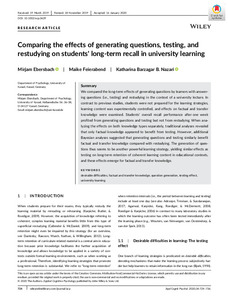Aufsatz

Comparing the effects of generating questions, testing, and restudying on students' long‐term recall in university learning
Zusammenfassung
We compared the long‐term effects of generating questions by learners with answering questions (i.e., testing) and restudying in the context of a university lecture. In contrast to previous studies, students were not prepared for the learning strategies, learning content was experimentally controlled, and effects on factual and transfer knowledge were examined. Students' overall recall performance after one week profited from generating questions and testing but not from restudying. When analyzing the effects on both knowledge types separately, traditional analyses revealed that only factual knowledge appeared to benefit from testing. However, additional Bayesian analyses suggested that generating questions and testing similarly benefit factual and transfer knowledge compared with restudying. The generation of questions thus seems to be another powerful learning strategy, yielding similar effects as testing on long‐term retention of coherent learning content in educational contexts, and these effects emerge for factual and transfer knowledge.
Zitierform
In: Applied cognitive psychology Volume 34 / Issue 3 (2020-01-21) , S. 724-736 ; eissn:1099-0720Förderhinweis
Gefördert im Rahmen des Projekts DEALZitieren
@article{doi:10.17170/kobra-202005071231,
author={Ebersbach, Mirjam and Feierabend, Maike and Barzagar Nazari, Katharina B.},
title={Comparing the effects of generating questions, testing, and restudying on students' long‐term recall in university learning},
journal={Applied cognitive psychology},
year={2020}
}
0500 Oax
0501 Text $btxt$2rdacontent
0502 Computermedien $bc$2rdacarrier
1100 2020$n2020
1500 1/eng
2050 ##0##http://hdl.handle.net/123456789/11565
3000 Ebersbach, Mirjam
3010 Feierabend, Maike
3010 Barzagar Nazari, Katharina B.
4000 Comparing the effects of generating questions, testing, and restudying on students' long‐term recall in university learning / Ebersbach, Mirjam
4030
4060 Online-Ressource
4085 ##0##=u http://nbn-resolving.de/http://hdl.handle.net/123456789/11565=x R
4204 \$dAufsatz
4170
5550 {{Universität}}
5550 {{Lernen}}
5550 {{Wissenschaftstransfer}}
5550 {{Frage}}
7136 ##0##http://hdl.handle.net/123456789/11565
<resource xsi:schemaLocation="http://datacite.org/schema/kernel-2.2 http://schema.datacite.org/meta/kernel-2.2/metadata.xsd"> 2020-05-20T07:54:40Z 2020-05-20T07:54:40Z 2020-01-21 doi:10.17170/kobra-202005071231 http://hdl.handle.net/123456789/11565 Gefördert im Rahmen des Projekts DEAL eng Attribution-NonCommercial-NoDerivatives 4.0 International http://creativecommons.org/licenses/by-nc-nd/4.0/ desirable difficulties factual and transfer knowledge question generation testing effect university learning 150 Comparing the effects of generating questions, testing, and restudying on students' long‐term recall in university learning Aufsatz We compared the long‐term effects of generating questions by learners with answering questions (i.e., testing) and restudying in the context of a university lecture. In contrast to previous studies, students were not prepared for the learning strategies, learning content was experimentally controlled, and effects on factual and transfer knowledge were examined. Students' overall recall performance after one week profited from generating questions and testing but not from restudying. When analyzing the effects on both knowledge types separately, traditional analyses revealed that only factual knowledge appeared to benefit from testing. However, additional Bayesian analyses suggested that generating questions and testing similarly benefit factual and transfer knowledge compared with restudying. The generation of questions thus seems to be another powerful learning strategy, yielding similar effects as testing on long‐term retention of coherent learning content in educational contexts, and these effects emerge for factual and transfer knowledge. open access Ebersbach, Mirjam Feierabend, Maike Barzagar Nazari, Katharina B. doi:10.1002/acp.3639 Universität Lernen Wissenschaftstransfer Frage publishedVersion eissn:1099-0720 Issue 3 Applied cognitive psychology 724-736 Volume 34 false </resource>
Die folgenden Lizenzbestimmungen sind mit dieser Ressource verbunden:


